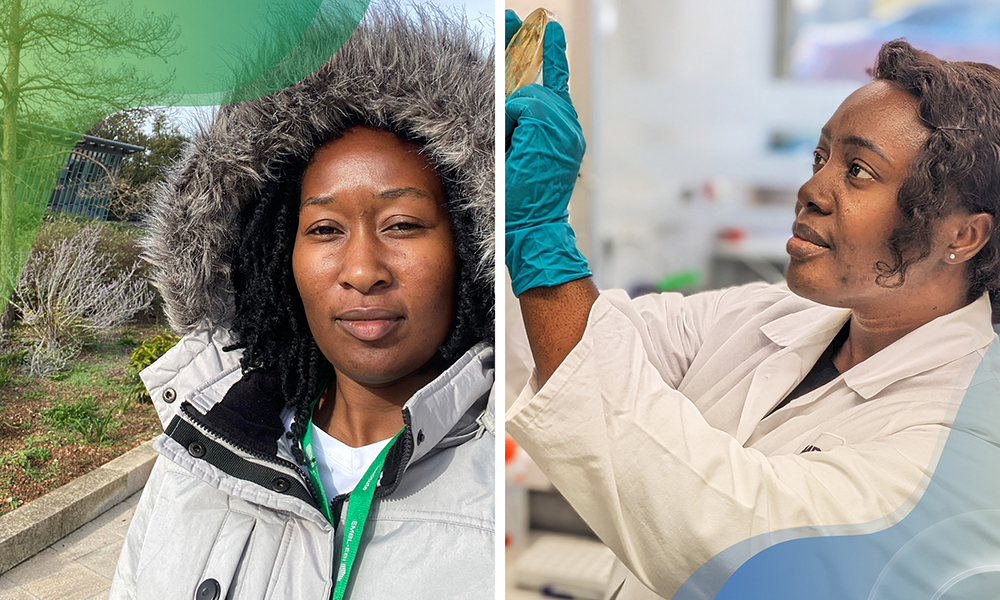
Gaining skills and building connections in infection biology
The first EMBL-UNESCO fellows share experiences and insights from their residencies that focused on infection biology

Scientific advancements don’t happen in isolation. They rely on international and multidisciplinary dialogue. To support this approach, and as part of its ‘Molecules to Ecosystems’ scientific programme, EMBL teamed up with UNESCO to establish a new residency in the area of infection biology, aimed at female African early career scientists.
This initiative follows the 2023 signing of a Memorandum of Understanding between EMBL and UNESCO, dedicated to promoting greater collaboration in the areas of open science, capacity building in developing countries, and the sharing of key resources to foster greater gender equality in science. The residency is run by the Scientific Visitor Programme in collaboration with participating group leaders of the Infection Biology Transversal theme at EMBL.
The first two fellows of this residency, Tendai Washaya and Adwoa Padiki Nartey, have now completed their three-month stays at EMBL and have shared their observations and insights.
Tendai Washaya
Washaya, a PhD fellow from the University of Zimbabwe, is studying multi-resistant HIV-1. Because of this resistance, many people who receive HIV therapy still die from the disease. This motivated Washaya to investigate affordable drug resistance testing methods for resource-limited countries. She joined the Lees group at EMBL-EBI to hone her next-gen sequencing and bioinformatics skills. Washaya shares her thoughts below:
“As a visiting PhD student at EMBL-EBI, I had the privilege of immersing myself in a vibrant and intellectually stimulating research environment. From the moment I stepped onto the EMBL-EBI campus, I was captivated by the palpable energy and enthusiasm that permeated the atmosphere. The institute’s dedication to cutting-edge research was evident in its state-of-the-art facilities, the collaborative spirit among researchers, and the wealth of opportunities for professional development.
“During my time at EMBL-EBI, I had the opportunity to work alongside world-renowned scientists in the field of bioinformatics. Their expertise and guidance were invaluable as I delved deeper into my research project. I was particularly impressed by the willingness of my colleagues to share their knowledge and insights, creating a supportive and encouraging learning environment.
“Beyond the research lab, EMBL-EBI offered a plethora of opportunities to engage with the broader scientific community. I attended seminars, workshops, and conferences, gaining exposure to the latest advancements in bioinformatics and connecting with researchers from around the globe. These interactions not only broadened my scientific horizons but also enriched my understanding of the global research landscape.
“My experience at EMBL-EBI has been nothing short of transformative. The institute’s commitment to excellence, its fostering of collaboration, and its dedication to nurturing the next generation of scientists have left an indelible mark on my academic journey. I am deeply grateful for the opportunity to have been a part of such a remarkable institution and look forward to carrying the lessons learned and the connections forged during my time at EMBL-EBI into my future endeavours.”
Adwoa Padiki Nartey
Nartey, a 33-year-old researcher at the University of Ghana, has been striving to understand how and why microbes resist antibiotics, to inform the development of more effective antibiotics. She points out that the issue is particularly important to the African continent where the WHO estimates over 700,000 deaths occur annually as a result of resistance to antibiotics. They predict this number only to grow, reaching an estimated 4.1 million deaths by 2050. Nartey spent three months with the Typas Group at EMBL Heidelberg, where predocs, postdocs, and other researchers, including guest researchers like Nartey, study bacterial cellular networks, seeking to understand their interactions with the environment, hosts, and other bacterial species. The following are Nartey’s observations:
“As a visiting scientist, I got to benefit from a remarkable period of discovery. Not only did it enhance my research, but it came with new cultural experiences, a beautiful new landscape, and an overall positive experience.
“This particular EMBL campus is situated in the mountains and offers a beautiful view of Heidelberg. My first impressions were of its captivating and exquisite architecture and state-of-the-art facilities. Administrative staff in charge of my visit made settling in effortless, and weekly chats over coffee to discuss my experiences were always a delight.
“I was privileged to be part of the ‘Typas Tribe’ in EMBL’s Genome Biology unit. Initially, I was a little apprehensive about working with experts in analysing genomic data related to my research topic. This aspect was quite new to me, but I learned a lot from my colleagues, who provided helpful feedback both day to day, and when I presented my work during a group seminar. The ‘Laboratory Kitchen’ was also a nice support system to discover. It assembles the universal and specialised agar plates and media for research, as well as other things like washing and autoclaving of glassware – a significant time saver.
“And although the weather was not particularly friendly during winter, Heidelberg is a tourist town, so there was never a boring weekend, especially during the festive Christmas market season. Social events and social clubs, too, catered to my overall well-being and that of others.
“In addition to the scientific knowledge and new skills I acquired during my time at EMBL, I also absorbed new leadership skills from my group leader and colleagues, which will continue to serve me as a young principal investigator. After EMBL, I look forward to maintaining these new networks for future collaborations in antimicrobial resistance research projects.”
EMBL is currently accepting applications for its next cohort of fellows to participate in this Residency in Infection Biology Research programme. Interested applicants can find information about the programme at this link. Deadline to apply is 31 March 2024.


